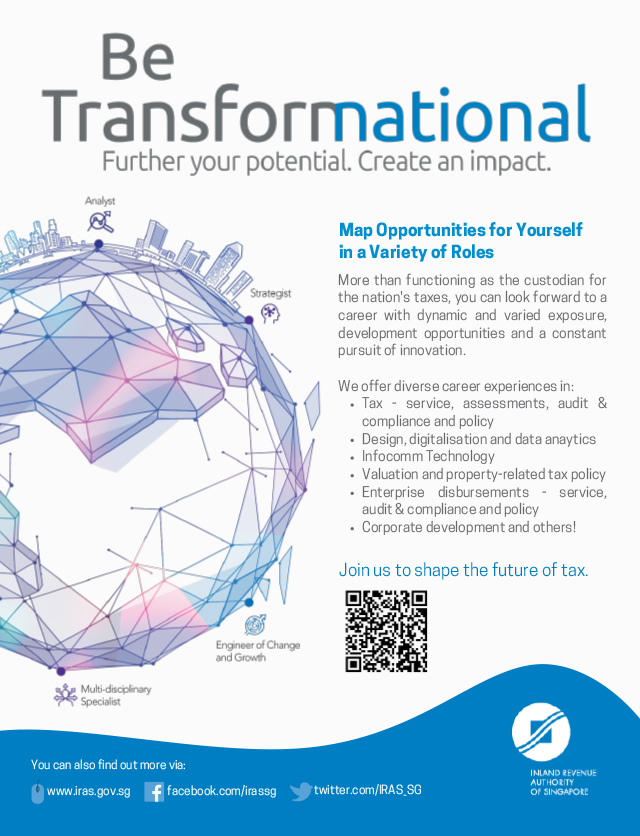Teo Hui Hian is currently the Director of the Valuation and Stamp Duty Branch at the Inland Revenue Authority of Singapore. She is an awardee of the IRAS Postgraduate Scholarship and has received her Bachelor of Science in Chemistry and Biological Chemistry from NTU and Master of IT in Business (Analytics) from SMU.
In today’s world, tax policies have become increasingly crucial for economic stability and laying the groundwork for sustained growth. Those responsible for shaping these policies at the Inland Revenue of Singapore (IRAS) must possess a deep understanding of the various tax issues, and the available data to facilitate efficient policy making. Scholar Teo Hui Hian, in her role as the Director of the Valuation and Stamp Duty Branch at IRAS, exemplifies this responsibility with exceptional skill.
Hui Hian embarked on her journey as an analyst with IRAS in 2013, driven by her budding interest in data analytics. Her contributions proved invaluable to the development of IRAS’ analytics roadmap, outlining the organisation’s medium-term analytics direction and competency development.
Subsequently, she was given the exposure to drive IRAS’ transformation journey, where she was involved in data and digital strategic work, transformation planning, and business process review. Here, she played a pivotal role in formulating data and digital strategies as well as digital communication strategies that were vital to the agency’s success.
Hui Hian’s IRAS Postgraduate Scholarship enabled her to pursue a Master of IT in Business (Analytics) at SMU. Following her completion of the programme, she joined the Property Tax Division and headed the Data, Stamp Duty Compliance and Policy Teams.
We had the opportunity to speak with Hui Hian to gain deeper insights into her remarkable journey and the vital work she undertakes.
How did you get interested in data analytics?
It all started when I was a young officer in the Ministry of Finance (MOF) analysing the data generated by IRAS for the purpose of reviewing tax policies. This piqued my curiosity regarding data analytics as I could see the potential in how it can be used for policy review and many other areas. More importantly, the process of analysing the data for policy reviews developed my interest in IRAS, given the richness and amount of data available. This set me off on my journey in data analytics where I started my career in the central analytics team in IRAS.
During my time there, I had the chance to work on a variety of analytics projects using different techniques. In addition, I also had the opportunity to go on a study trip to the UK to learn how their tax authority uses social network analytics for their operations. From the learnings gleaned during the study trip, we adopted the findings and introduced the use of social network analytics in IRAS to augment our compliance efforts.
Besides technical analytics work, I was also exposed to strategy-related work, for instance in charting out the organisation’s mid-term analytics roadmap. This exposure to strategy work also helped prepare me for my subsequent posting in the transformation and strategic planning team.
Through the IRAS Postgraduate Scholarship, you were able to pursue a Master of IT in Business (Analytics). How have you been able to apply what you learnt to your current job?
The post-graduate study at SMU was a wonderful experience. I had the chance to interact and exchange ideas with course mates from different backgrounds and who had varying work experiences. Besides the knowledge gained from the formal coursework, such informal interactions also helped to broaden my perspectives.
In addition, the course also helped to reinforce and strengthen my understanding of the matter such as text analytics and social network analytics that I previously had the chance to work on in IRAS. It also broadened my horizons and allowed me to appreciate other application areas (beyond tax!).
The knowledge and ideas were particularly useful when I returned to head the DART (Data Analytics and Research Team) in the Property Tax Division. I was able to put what I have learned into practice in leading the team to further enhance our analytics capabilities. For example, we harnessed the use of text analytics for document classifications. In addition, some of the knowledge gained from the digital-related modules also better supported my understanding of the technical IT aspects during technical discussions on the data and system infrastructure.
While property tax and stamp duty may appear to be very niche areas, there are endless opportunities to use analytics in these areas. For instance, besides using geospatial analytics to enhance our valuation models, another exciting area for us is to explore the use of Generative AI to support our officers in their assessment work.

Teo Hui Hian
Speaking of your work, what do you find most fulfilling about it?
I am currently the Director of the Valuation and Stamp Duty Branch in IRAS. The Branch handles the end-to-end process of stamp duty administration from policy reviews and system development to case assessment and compliance work. The DART team also resides in the branch and drives the use of analytics in the Property Tax Division.
There is never a dull moment when I am performing this role, given the diverse nature of the work. You can be discussing stamp duty policies with the MOF one moment, and then you’re challenging the team to explore the use of new analytics capabilities in new application areas the next. For me, the most meaningful part of my work is to see the difference that I have made in translating policies into reality.
Finally, what possibilities await those aspiring to join IRAS?
There are many possibilities and options available for those in IRAS. While we are the tax authority, it is not all about tax. There is a multitude of career options available in IRAS ranging from data analytics, behavioural insights and design, Infocomm, and corporate and legal work.
There are also many opportunities available in IRAS where officers are not only involved in their core work but also in cross-functional projects and corporate-wide projects or events.



